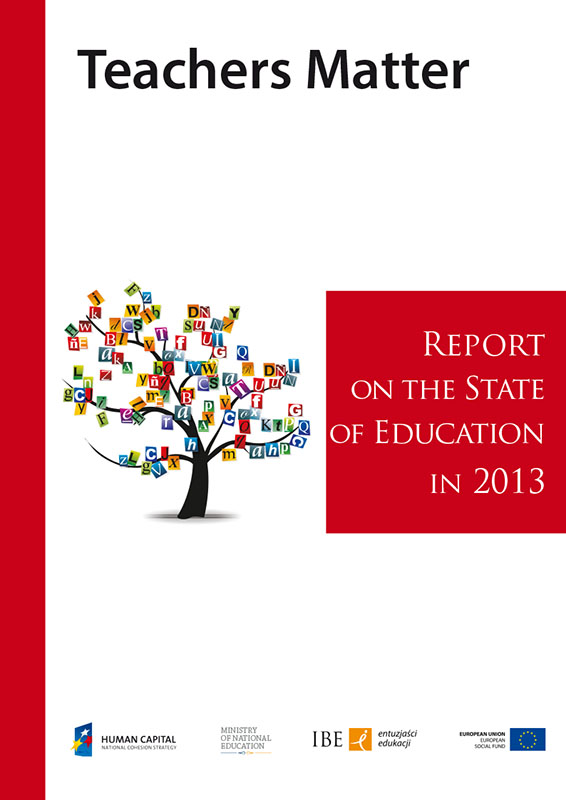Report on the State of Education in 2013
- Published on Tuesday, 23 February 2016 18:48
 ROSE 2013 Okladka ENG‘The teacher is of vital importance’, is an expression of ever greater significance, worthy of repetition and search for its new meanings. It is almost certain that the importance of the teacher is not one that will last for eternity. Today the role of the teacher is not the same as in the past, when schools were being built and numbers in the profession rose quickly. Now, teaching is one of the largest professions, rather varied, but with a strong common sense of identity. This engenders strengths and weaknesses in the development and projection of the teacher’s new role. Between times, just what modern teachers are and will be like, signifies the country’s capacity for long-term progress.
ROSE 2013 Okladka ENG‘The teacher is of vital importance’, is an expression of ever greater significance, worthy of repetition and search for its new meanings. It is almost certain that the importance of the teacher is not one that will last for eternity. Today the role of the teacher is not the same as in the past, when schools were being built and numbers in the profession rose quickly. Now, teaching is one of the largest professions, rather varied, but with a strong common sense of identity. This engenders strengths and weaknesses in the development and projection of the teacher’s new role. Between times, just what modern teachers are and will be like, signifies the country’s capacity for long-term progress.
Download Report on the State of Education in 2013 [PDF 12,5MB]
This is why this year’s report is reserved for teachers. Its function is to present facts, supported by national and international research, to describe the situation and contribute to mature public debate on the topic. The main audience includes the broad range of public opinion, together with educationalists, economists, politicians and above all teachers themselves. This implies both those teaching in the school system and in Higher Education, two communities which are poorly connected - something which impedes further progress. University resources, if made more widely available, could be used to unleash new approaches to work with young people to guarantee the constant creative foment needed as the foundation for the modern teacher’s role. The report does not pretend to offer a ‘grand synthesis’ or ‘conclusive recommendations’. For this, a wider public debate would be necessary. The report does, however, offer a faithful picture of the present situation. A number of problems and also their legal remedies require considered discussion for revision of the functions of institutions, which at this time are written into law. The institution of teacher career progression is one clear cut example.
Digital Reality of Polish lower secondary school students (ICILS 2013)
- Published on Friday, 21 November 2014 23:44
Excellent scores of Polish lower secondary school students. Second grade students of lower secondary schools at the forefront with some of the best results in the International Computer and Information Literacy Study (ICILS)The Educational Research Institute announced the results of ICILS study which measures the readiness of students to live in a "digital world". The study examined how lower secondary school students can investigate, create and communicate information using a computer.
.Polish Lower Secondary School Teachers and Headmasters in the Light of Teaching and Learning International Survey (TALIS 2013)
- Published on Tuesday, 29 July 2014 14:58
Work with pupils with special educational needs, classroom management, use of modern technologies – these are the main training needs of Polish teachers. 94% of Polish teachers believe that it is necessary to focus on teaching children independent thinking. Polish teachers are distinguished by better discipline during classes. Only in Poland teachers are appraised solely by headmasters.
.8,000 schools have signed up for National Study of the Third Graders' Skills
- Published on Tuesday, 13 May 2014 00:38
Both studies - OBUT and DUMa - will be held on the same day - May 20. The National Study of the Third Graders' Skills will be held for the fourth time. The first round of OBUT was conducted in 2011. This year's edition will differ from the previous three in that the study will only only focus on selected mathematical skills of students. The worksheets will let the participants show the skills they acquire in everyday school classes, but also to demonstrate applying them to nonstandard situations.
Thanks to OBUT study the teachers of the participating schools will gain a broader perspective of their students' skills. All the participating schools will receive reports with the results of individual students, group/class reports divided into skill areas and the results of the entire school compared with the results of other schools.
DUMa study will be conducted for the first time. Thanks to the study that will focus on fifth-graders' skills, teachers will be able to better prepare their children for the revised national end-of-primary-school test organized by the Central Examination Board. Fifth-graders are taught in accordance with the new Core Curriculum introduced in all primary schools in 2009 and the test will examine, among others, their ability of mathematical modelling and strategy development. The information from the study will help teachers to better plan the work in the sixth grade..







